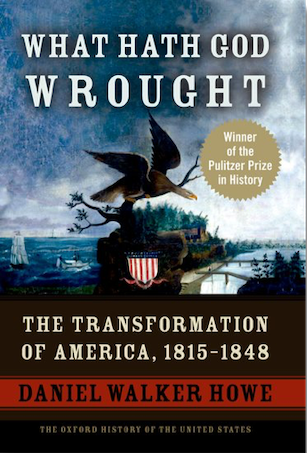
“The fourth of March 1845: Rain fell on the inaugural parade along Pennsylvania Avenue, and when the new president arrived at the Capitol to deliver his address and take the oath of office from Chief Justice Taney, he looked out upon a sea of umbrellas. Despite the unfavorable elements, James Knox Polk made himself heard, as he would for the next four years. The speech was characteristic of the man. It rehearsed Democratic Party orthodoxies, perhaps traceable to Polk’s family background in the rustic simplicity and Old School Calvinism of Mecklenburg County, North Carolina. . . .
“[H]e gave a ringing endorsement to the annexation of Texas, regardless of its impact on the slavery question. Wherever Americans chose to settle, Polk declared, the federal government should extend its protection over them, a principle he applied to both Texas and Oregon. He repeated the assertion of the Democratic platform: ‘Our title to the country of Oregon is clear and unquestionable.’ This bald affirmation went down well with those under the umbrellas, but when the text arrived across the Atlantic, it made a bad impression. ‘We consider we [too] have rights in this Oregon territory which are clear and unquestionable,’ Prime Minister Peel responded in the House of Commons. No one at the time remarked that the incoming president had left out the words ‘the whole of’ in restating his party’s Oregon platform, but their omission may have been a straw in the wind.
“To James Knox Polk, the imperial destiny of the United States manifested itself plainly enough. But it would be the press, not a presidential oration, that fixed the term ‘manifest destiny’ for the American public. In the summer of 1845, one of America’s most popular magazines, New York’s Jacksonian Democratic Review, addressed the Texas issue. Annexation still awaited ratification by a popular vote of the Texans; in the United States, public opinion remained bitterly divided. Nevertheless, the Review argued, ‘It is time now for opposition to the annexation of Texas to cease.’ The integration of Texas into the Union represented ‘the fulfilment [sic] of our manifest destiny to overspread the continent allotted by Providence for the free development of our yearly multiplying millions.’ . . .
“‘Manifest destiny’ served as both a label and a justification for policies that might otherwise have simply been called American expansionism or imperialism. . . .
“National aspirations to empire could fit comfortably alongside certain conceptions of American millennialism. As the South Carolina poet William Gilmore Simms wrote in 1846:
We do but follow out our destiny,
As did the ancient Israelite — and strive,
Unconscious that we work at His knee
By whom alone we triumph as we live.
If America had a divine mission to perform, to be a beacon of freedom and prepare the way for a messianic age, then perhaps increasing its extent and power would bring blessings to the whole world. ‘A higher than any earthly power,’ declared Robert Walker, propagandist for Texas whom Polk would appoint secretary of the Treasury, ‘still guards and directs our destiny, impels us onward, and has selected our great and happy country as a model and ultimate centre of attraction for the all nations of the world.’ When George Bancroft, the greatest American historian of his day and an enthusiastic Jacksonian Democrat, published the first volume of his History of the United States of America in 1834, it appeared with this motto on the cover: ‘Westward the star of empire takes its way.’ Bancroft’s history portrayed his country fulfilling a providential destiny as an example of human liberty. . . .
“Antebellum Americans typically linked the history of political liberty with Protestantism. Accordingly, it was possible to argue that the expansion of the United States would secure the continent for liberty and Protestantism, and save it from Catholic Mexico, whose ‘cruel, ambitious, and licentious priesthood,’ according to Robert Walker, stood ever ‘ready to establish the inquisition.’ Despite the support Catholic voters gave the Democratic Party, anti-Catholicism was featured alongside claims of Anglo-Saxon racial superiority in the rhetoric of Jacksonian expansionists like Walker. . . .
“The historian Amy Greenberg has suggested that rival versions of American imperialism corresponded to different conceptions of manliness: ‘martial manhood,’ which endorsed expansion through violence, including private filibustering expeditions and war, and ‘restrained manhood,’ which preferred nonviolent forms of national expansion through commerce and missionary activity. If she is right, the violence in the lives of working-class urban young men helps explain the popularity among them of imperialism through conquest. . . .
“Whether or how to pursue an imperial destiny was thus a matter of controversial public policy. The American empire did not come into existence ‘unconsciously,’ as the poet Simms alleged, or simply through the westward migration of individual families into a vacant continent. If American expansion had been truly a manifest, inevitable destiny, then it could have taken place peacefully and automatically. In practice, how-ever, like all empires, the American one required conscious deliberation and energetic government action to bring it into being, to deal with previous occupants and competing claims to ownership. Power politics, diplomacy, and war proved as much a part of America’s ‘manifest destiny’ as covered wagons. Jacksonian Democracy, for all its disavowals of government agency, demonstrated eagerness to exploit the authority of government in expanding the American empire.”
— from Daniel Walker Howe, What Hath God Wrought: The Transformation of America, 1815–1848 (Oxford University Press, 2007)
You can hear Howe discuss this book on this Friday Feature.